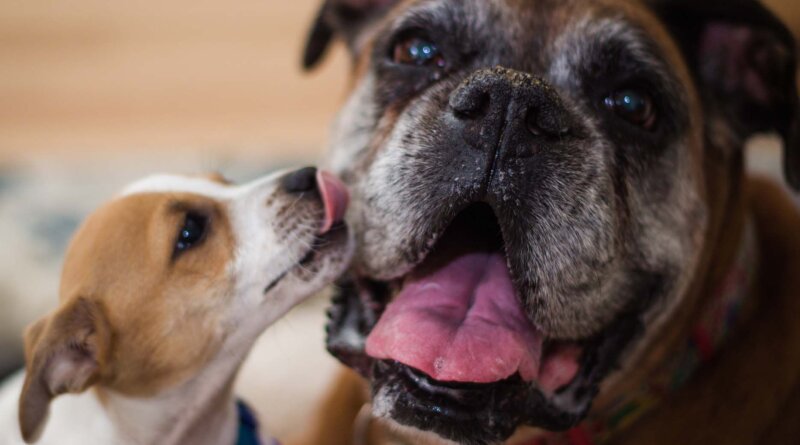Why Do Dogs Lick Each Other?
Dogs explore the world using their incredible sense of smell and their tongues. Licking is an established dog behavior, and at least one study has linked it to the release oxytocin, a hormone commonly called one of the “happy” hormones. So, licking makes your dog feel good.
Licking is also an important method of communication. In Psychology Today, Stanley Coren PhD., DSc, FRSC, said: “For dogs, licking can communicate information about relative status, intentions, and state of mind, but it is most frequently a peacemaking or pacifying behavior.”
Why Do Dogs Lick Faces?
We know that female dogs lick their puppies at birth to stimulate elimination and to clean them.
But why do dogs, often unrelated, lick each other’s ears, mouths, and faces? Research holds many viable theories. Among the most common beliefs is that it’s a way of appeasement or calming. German animal behaviorist Angelika Firnkes’s 2016 study published in the Journal of Veterinary Behavior found that licking their own lips may be a way of canine appeasement when greeting another dog or a person.
There may be a physical reason, too. A 2012 study published in the Journal of Veterinary Behavior found a relationship between dogs who obsessively licked surfaces and internal gastrointestinal disorders.
Dog Licking Behavior
Puppies lick their dams around the mouth to stimulate vomiting up partly digested food, begging for food, and for submissiveness. The overall body language of a submissive dog is a lowered body, ears back, coming up to the mouth. Adult dogs who do a lot of this are often low on the totem pole in the household.
The University of Bristol Veterinary School cautions that an increase in licking activity may be a message that the dog is experiencing anxiety or fear. Look closely at what’s happening when the licking begins to see if you can determine why the dog is licking. If you suspect anxiety or fear, your veterinarian can prescribe medication to help.
Why Does My Dog Lick Other Dogs’ Ears?
As we’ve noted, licking may be a social, or pack, behavior. From the veterinary standpoint, physical causes also may a reason. Some licking may be stimulated by blood due to an injury or the smell of an infection. Oral infections could also attract licking due to the odor, so it may not be just ears.
Of course, licking around the mouth could also be opportunistic if the dog being licked has food residue around his muzzle.
Some veterinarians think dogs simply like the taste of ear wax or discharge. Ear wax is believed to be a little salty, and it includes dead skin cells, dirt, and other debris. If the dog with the wax-laden ears seems at all painful, that dog should be seen by your veterinarian to rule out illness and so you can learn more about cleaning your dog’s ears.
If your dog is licking other dogs as a way of socializing, and you don’t see any indication of fear, it’s OK. If the dog who is being licked doesn’t seem well, your licking dog may have just given you a heads up to a brewing infection or injury.




